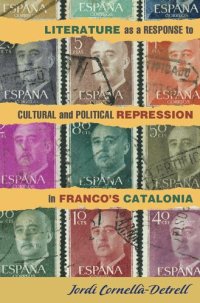
Ebook: Literature as a Response to Cultural and Political Repression in Franco's Catalonia
Author: Jordi Cornellà-Detrell
- Series: Monografías A Volume 295
- Year: 2011
- Publisher: Boydell & Brewer
- Language: English
- pdf
During the 1950s and 1960s, several key Catalan authors set about rewriting some of their narrative work despite the obstacles to publication in Catalan under the Franco regime. This study describes the social, political and cultural conditions that impelled Salvador Espriu, Xavier Benguerel, Sebasti Juan Arb and Joan Sales to revise Laia, El testament, Tino Costa and Incerta glria, concentrating particularly on the linguistic debates and literary trends from the 1950s to the early 1970s.
Drawing on a wide range of theoretical perspectives, this book examines the reasons for the rewriting, including censorship and self-censorship, generational and ideological changes within the Catalan literary field, controversies over linguistic purism, the appearance of new literary trends and gender and political issues. It focuses on the (re)construction of a distinctive national identity and the impact of repression, memory, exile and silence on the representation of the war and the post-war periods. This study explores not only how writers or society at large were affected by the dictatorship, but how the armed conflict left its mark on the writing process itself.
Jordi Cornell-Detrell is a Lecturer in Spanish in the School of Modern Languages at Bangor University.
Table of Contents
Acknowledgements
Introduction: The Rewriting of Laia, El Testament, Tino Costa and Incerta Glria
Language, Literature and the Writer in Franco's Catalonia
Disembodying the Nation: The Rewriting of Laia by Salvador Espriu
Reading between the Lines: Silences and Double Language in Xavier Benguerel's El Testament
Chronotope and Language Change in Arb's Tino Costa
The Undercurrents of History: Memory, Language and Fiction in Joan Sales's Incerta glria
Conclusion
Bibliography
Drawing on a wide range of theoretical perspectives, this book examines the reasons for the rewriting, including censorship and self-censorship, generational and ideological changes within the Catalan literary field, controversies over linguistic purism, the appearance of new literary trends and gender and political issues. It focuses on the (re)construction of a distinctive national identity and the impact of repression, memory, exile and silence on the representation of the war and the post-war periods. This study explores not only how writers or society at large were affected by the dictatorship, but how the armed conflict left its mark on the writing process itself.
Jordi Cornell-Detrell is a Lecturer in Spanish in the School of Modern Languages at Bangor University.
Table of Contents
Acknowledgements
Introduction: The Rewriting of Laia, El Testament, Tino Costa and Incerta Glria
Language, Literature and the Writer in Franco's Catalonia
Disembodying the Nation: The Rewriting of Laia by Salvador Espriu
Reading between the Lines: Silences and Double Language in Xavier Benguerel's El Testament
Chronotope and Language Change in Arb's Tino Costa
The Undercurrents of History: Memory, Language and Fiction in Joan Sales's Incerta glria
Conclusion
Bibliography
Download the book Literature as a Response to Cultural and Political Repression in Franco's Catalonia for free or read online
Continue reading on any device:

Last viewed books
Related books
{related-news}
Comments (0)